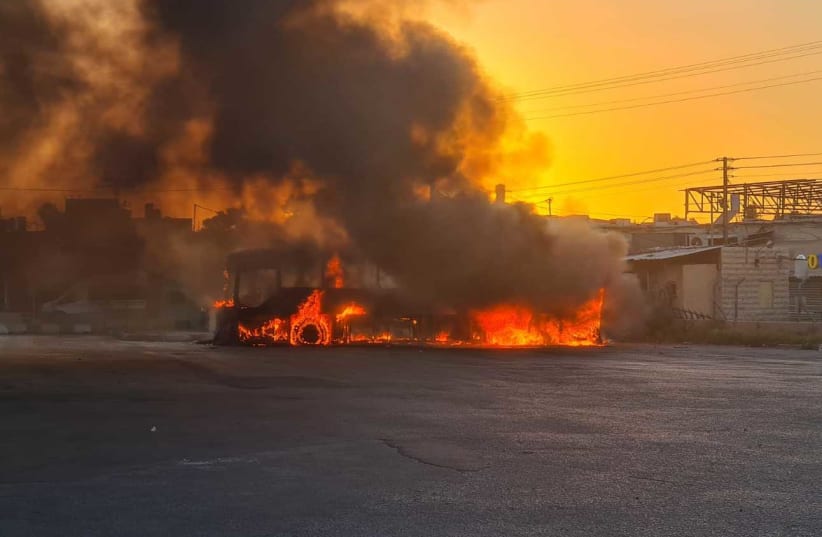Smashed windows, a burnt out security post, rocks and rubble strewn around some streets, and still smoldering rubbish bins began to paint a fuller picture, and then a classroom in the Maoz yeshiva reduced to a burnt-out ruin told of the full violence of Monday night’s riot.
Following high tensions in Jerusalem and the physical battles between worshipers and rioters on the Temple Mount with the police, large numbers of Lod’s Arab residents took to the streets in protest at the events in the capital.
Fires were set, stones were thrown, vehicles attacked, and at one point an Israeli flag erected by the municipality was torn town and replaced with the Palestinian flag.
According to Jewish residents of the city, Arab protesters began approaching the Jewish neighborhood of Nof Naveh at around 1 p.m. throwing rocks and petrol bombs, following which a 34-year-old Jewish resident shot and killed Musa Hasuna, a 25-year-old Arab resident.
During the course of events, the Maoz yeshiva in the mixed Jewish - Arab Ramat Eshkol neighborhood was firebombed, causing massive damage to one classroom and lesser damage to another, as well as superficial damage to the facade of the building.
Violence continued on Tuesday night following the funeral of Hasuna, with rioters clashing with riot police, throwing rocks and rubble and once again setting fires.
Tahael Harris, a resident of Ramat Eshkol, was holding an event for around 70 university students at the local community center. As it drew to a close at around 10 p.m., organizers realized that no one could leave the center because of the severe riots taking place.
“People from the other buildings shouted to us that there were too many Arabs throwing rocks, setting fire to trees, and yelling that it was not safe to leave,” said Harris.
The police were called, and the students were eventually escorted out of the building some two hours later at midnight.
“I don’t know who did these riots, but I know that my neighbors let it happen, and it’s very hard knowing that,” Harris said. “They didn’t stand up and make it stop.”
She said that until now inter-communal relations between Jews and Arabs had been positive, although not “a fairytale,” and that she herself works together with Arab residents of Lod in the community center and that the two groups have gotten along well.
Harris expressed strong criticism toward the police for failing to turn up sooner, and said she was worried for her safety and the safety of all the students.
She said the events had made her feel insecure in the city, and that even though she did not want to think about moving out because of the strong community that has been built, life in Lod would be different as a result of the riot.
“We won’t be able to continue living like this, something will have to change,” said Harris.
Tzur Raanan, a resident of Ramat Eshkol of six years and father of three small children, said that “the majority of the time” there have been good neighborly relations between Arabs and Jews, noting that in his apartment building there were four Arab families and four Jewish families.
“We are still shocked by what happened here last night, but it seems this tension has always been with us under the surface,” said Raanan.
Like Harris, he was very critical of the slow police response to the violence, and that together with other incidents, it has given rise to the feeling that the rule of law is not imposed in Lod.
Asked if he believed the riot by Arab residents reflected sentiment amongst the broader Arab population of Lod, Raanan said he did, to a certain extent.
“Maybe it would be easier for us to say it was just a small minority, just youths, but I saw with my own eyes out of my window lots of people coming out of buildings in the blocks around me, covering their faces so they couldn’t be identified, and joining the people burning stuff,” said Raanan.“And I saw in videos people of all ages, 40 year olds and older, people who burnt the Israeli flag, women who encouraged them. I cannot say that all Arabs in this city were active participants, but it is definitely a general sentiment among the Arab population. It is not lone individuals”
Raanan said he was not especially disappointed in the Arab community because “I would never trust with a whole heart Arab neighbors, even when we have good neighborly relations with them. I am not shocked by what happened yesterday; I knew that things like this could happen.”
Around the corner just a few hundred meters away, one Arab resident saw things very differently.
Mohammad, a lifelong Lod resident in his late 20s or early 30s who not would give his last name, was visibly angry over the situation in the city.
He insisted that there had been no need for Hasuna to be shot and killed, and said the protest was peaceful, although he admitted he had not been present.
Mohammad was also furious at the police response to the disturbances, saying that it had been too aggressive.
“There was no need to come in firing rubber bullets and stun grenades, and with all these troops,” he protested. “It made us feel that we don’t belong here, and that this is not our home.”
Mohammed said relations between the Arab and Jewish communities had been badly damaged by Monday’s events and the death of Hasuna, but expressed hope for better times.
Despite the pall hanging over the city and the ongoing inter-communal tensions, Mohammed together with Harris and Raanan all said they greeted their respective Jewish and Arab neighbors with their usual smile and a “good morning” after Monday night’s events.
One spark of hope in a city still smoldering.
